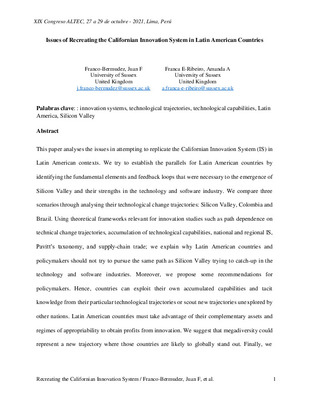| dc.contributor.author | Franco-Bermudez, Juan F. | |
| dc.contributor.author | Franca E-Ribeiro, Amanda A. | |
| dc.date.accessioned | 2022-05-10T18:11:45Z | |
| dc.date.available | 2022-05-10T18:11:45Z | |
| dc.date.issued | 2021 | |
| dc.identifier.uri | https://repositorio.pucp.edu.pe/index/handle/123456789/184711 | |
| dc.description.abstract | This paper analyses the issues in attempting to replicate the Californian Innovation System (IS) in Latin American contexts. We try to establish the parallels for Latin American countries by identifying the fundamental elements and feedback loops that were necessary to the emergence of Silicon Valley and their strengths in the technology and software industry. We compare three scenarios through analysing their technological change trajectories: Silicon Valley, Colombia and Brazil. Using theoretical frameworks relevant for innovation studies such as path dependence on technical change trajectories, accumulation of technological capabilities, national and regional IS, Pavitt’s taxonomy, and supply-chain trade; we explain why Latin American countries and policymakers should not try to pursue the same path as Silicon Valley trying to catch-up in the technology and software industries. Moreover, we propose some recommendations for policymakers. Hence, countries can exploit their own accumulated capabilities and tacit knowledge from their particular technological trajectories or scout new trajectories unexplored by other nations. Latin American countries must take advantage of their complementary assets and regimes of appropriability to obtain profits from innovation. We suggest that megadiversity could represent a new trajectory where those countries are likely to globally stand out. Finally, we highlight some reflections in terms of specific elements that can be promoted through science, technology and innovation policies to leverage Latin American IS. Such as being driven by inclusive approaches, retaining the human capital, fostering the academia-industry relationships, and embedding the policy evaluation stage as a fundamental part of the policy process. | |
| dc.language.iso | spa | |
| dc.publisher | Asociación Latino-Iberoamericana de Gestión Tecnológica y de la Innovación (ALTEC) | |
| dc.rights | info:eu-repo/semantics/openAccess | es_ES |
| dc.rights.uri | http://creativecommons.org/licenses/by-nc-nd/2.5/pe/ | * |
| dc.subject | Innovation Systems | |
| dc.subject | Technological Trajectories | |
| dc.subject | Technological Capabilities | |
| dc.subject | Latin America | |
| dc.subject | Silicon Valley | |
| dc.title | Issues of Recreating the Californian Innovation System in Latin American Countries | es_ES |
| dc.type | info:eu-repo/semantics/conferenceObject | |
| dc.type.other | Congreso | |
| dc.subject.ocde | https://purl.org/pe-repo/ocde/ford#2.11.00 | |
| dc.publisher.country | PE | |
| dc.relation.conferencedate | Octubre 27-29, 2021 | |
| dc.relation.conferencename | XIX Congreso Latino-Iberoamericano de Gestión Tecnológica y de la Innovación | |
| dc.relation.conferenceplace | Lima, Perú | |
| dc.contributor.corporatename | Asociación Latino-Iberoamericana de Gestión Tecnológica y de la Innovación (ALTEC) | |


